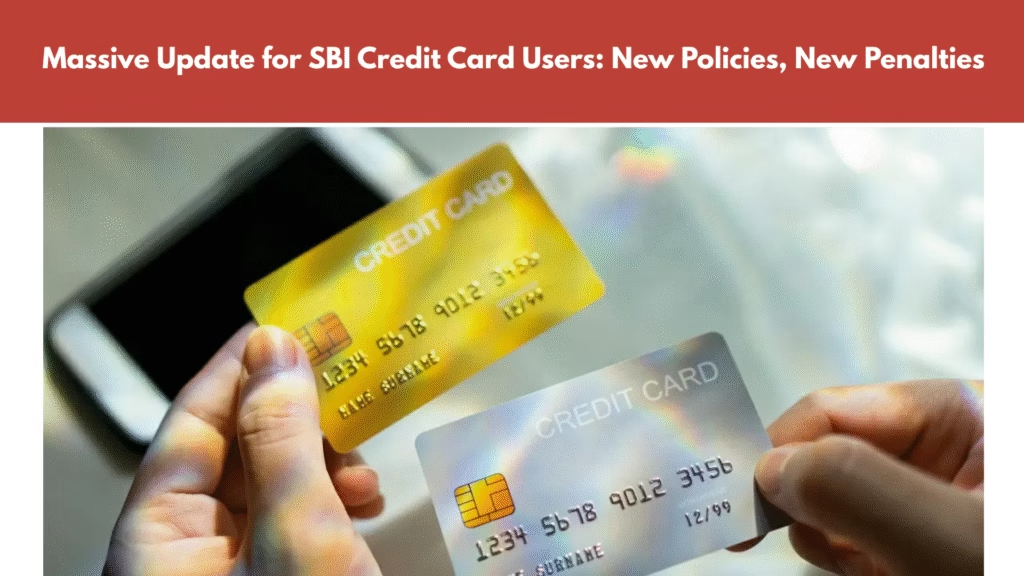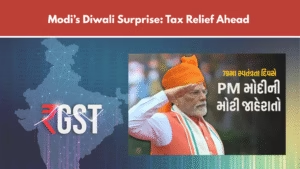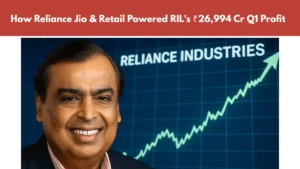Credit Card Holders Alert! India’s Largest Bank to Change Key Rules Within 10 Days

key rules related to its credit cards
Introduction
India’s largest bank — the State Bank of India (SBI) — is once again in the spotlight. This time, it’s not for launching a new service or expanding its reach but for changing some key rules related to its credit cards. These changes, set to roll out in the next 10 days, have created a ripple of alertness among the bank’s vast credit card customer base.
This blog is a detailed guide on what these rule changes mean, how they will impact you as an SBI cardholder, and what actions you must take to stay protected and make the best financial decisions going forward.
Why This Alert Is Important
SBI is not just another bank — it holds the title of being India’s largest public sector bank with millions of credit card holders. Any change in its policies, especially related to charges, reward points, and EMI conversions, can affect a large segment of the population.
These changes are effective from July 15, 2025, and are crucial for both regular credit card users and business holders who rely heavily on SBI cards for their transactions.

Overview of the Upcoming Changes
Here are the top changes SBI is implementing starting July 15, 2025:
1. Reward Points Redemption Policy Update
- New rule: Redemption of reward points will attract a processing fee of ₹99 + GST per transaction.
- Impact: Earlier, redeeming points was mostly free, now you’ll be charged, reducing the net benefit of accumulated points.
- Reason: SBI is aligning its reward system with global standards and increasing profitability on micro-transactions.
2. EMI Conversion Charges to Be Revised
- New rule: On-the-spot or post-purchase EMI conversions will now come with higher interest rates (starting at 16% annually) and processing fees up to ₹299.
- Impact: EMI conversions will now be slightly more expensive, affecting budget-conscious customers.
- Advice: Compare EMI rates across platforms before opting in.
3. Fuel Surcharge Waiver Limited
- New rule: SBI will now cap the fuel surcharge waiver at ₹100 per billing cycle.
- Impact: If you frequently use your SBI card for fuel payments, you will now pay higher charges beyond this cap.
- Reason: Rising fuel prices have pushed SBI to limit losses on surcharge waivers.
4. Late Payment Fee Restructure
- New rule: A revised slab for late payment penalties will be introduced:
- ₹0–₹500: ₹0
- ₹501–₹5,000: ₹500
- ₹5,001–₹10,000: ₹700
- Above ₹10,000: ₹950
- Impact: Steeper penalties for high unpaid dues.
5. Cash Advance Charges Hiked
- New rule: Cash withdrawal using SBI credit cards will now incur a higher interest rate of 3.5% per month with a transaction fee of 2.5% or ₹500 minimum, whichever is higher.
- Impact: Cash withdrawal becomes more expensive than ever.
- Advice: Avoid using your card for ATM withdrawals unless it’s an emergency.
Detailed Breakdown of Each Rule and Its Impact
Reward Point Redemption: What Changes and What It Means for You
SBI’s reward program was known for its generous redemption flexibility. However, the new processing fee of ₹99 + GST means:
- Smaller redemptions will not be worth it.
- You’ll need to accumulate a significant number of points before redeeming to make it worthwhile.
- Expect lower net benefits from categories like dining, groceries, and online shopping.
Impact on Loyalty and Cashback Lovers
Customers using SBI cards like:
- SimplySAVE
- IRCTC SBI Platinum
- BPCL SBI Card
Will feel the heat the most since these cards were heavily promoted for their reward potential.
EMI Conversion Policy: What’s the Real Deal?
Many SBI credit card holders rely on converting large purchases into easy EMIs. With the new changes:
- The entry threshold for EMI conversions may go up (minimum transaction of ₹3,000+).
- Interest-free periods may be restricted for EMI transactions.
- Processing fees will make small-ticket EMI conversions less appealing.
Impact on Online and Offline Shopping
Popular festivals and sales (like Amazon Great Indian Festival or Flipkart Big Billion Days) where EMI options were lucrative — these changes will force customers to rethink their purchase patterns or shift to other banks.

Fuel Surcharge Cap: What’s Changing in Real Terms
Previously, SBI offered fuel surcharge waivers up to ₹250–₹300 per cycle, depending on the card.
From July 15:
- A hard cap of ₹100/month will reduce benefits for:
- Frequent car or bike users.
- Commercial vehicle drivers using credit cards.
This move is a direct hit on high-spending segments, possibly nudging them to choose fuel-specific credit cards from competitors.
Late Payment Penalty: Why You Must Be Extra Cautious Now
The new late payment structure is designed to punish delays more aggressively:
- ₹500 fine on even modest dues of ₹501–₹5,000.
- ₹950 for dues above ₹10,000.
This is among the highest in the Indian market, and cardholders who miss payments even slightly will now incur significant penalties.
Cash Advance Becomes Even Riskier
Using credit cards for cash withdrawal was already discouraged due to high interest. With the updated 3.5% per month rate + ₹500 fee, it’s now financially dangerous.
Example:
Withdraw ₹5,000 in cash → Pay ₹500 fee instantly + ₹175 in interest in a month = ₹675 total for ₹5,000 withdrawal = 13.5% effective monthly loss.
Who Will Be Affected Most by These Changes?
1. Students & New Professionals
- Typically dependent on smaller redemptions and EMIs.
- Will lose on value-for-money usage.
2. Small Business Owners
- Use credit cards for high-volume fuel and online purchases.
- New caps and charges will reduce profitability.
3. Middle-Class Salaried Customers
- Depend on EMI options and timely repayments.
- Late fee changes will pinch.
What You Should Do Now: Action Plan Before July 15
✅ Check Your Current Reward Points
- Redeem high points now before the ₹99 + GST redemption fee kicks in.
✅ Avoid Using Card for Cash Withdrawals
- Instead, keep a personal loan or emergency fund in a savings account.
✅ Set Auto-Pay for Minimum Due
- To avoid late payment fees, even setting up minimum due autopay helps.
✅ Re-evaluate Your EMI Plan
- If you’re planning large purchases, do them before July 15 under the current EMI terms.
✅ Explore Alternatives
- Cards like HDFC Regalia, Axis ACE, or ICICI Coral may offer better terms post-changes.
Is This a Trend Among Indian Banks?
Yes. SBI isn’t alone. Recently, other banks like HDFC, ICICI, and Axis have also:
- Increased late payment penalties
- Revised reward policies
- Hiked interest on revolving credit
This is largely driven by:
- Rising operational costs
- Tighter RBI norms
- High default rates in unsecured credit
Customer Reactions So Far
Based on social media and forum discussions:
- Mixed reactions: Some understand the need for sustainability, others are considering switching.
- Frequent fliers and online shoppers feel the most affected.

What SBI Has Said Officially
While no press conference was held, SBI Card’s official notification (sent via SMS and in-app messages) cites:
- “We periodically revise features and charges to serve you better.”
- “Effective July 15, 2025, select features of your SBI Credit Card will be updated.”
This leaves room for more changes beyond what’s public now.
Conclusion
The SBI Credit Card Rule Change 2025 marks a significant shift in how India’s largest bank structures its credit card offerings. While these changes may feel restrictive or expensive, they’re part of a larger industry-wide trend.
What matters most is:
- Staying informed,
- Taking timely action before July 15,
- Considering better or alternative financial products if needed.
Being proactive is the only way to minimize financial loss and maximize your benefits in today’s evolving banking landscape.




